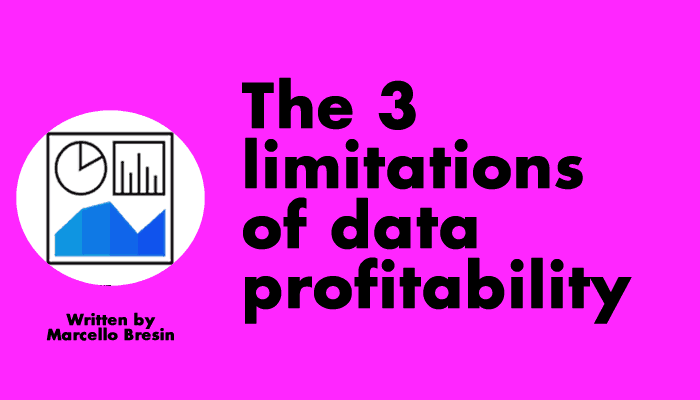As a business dealing with travelers, unless you have one or two bookings per week -in which case you’re catering for the filthy rich, or about to close shop- you own plenty of data to get a profit from. Everybody assumes by now that’s a fact; if you didn’t so far, you’d better ASAP. “It’s the data-driven economy, stupid”, Clinton would say.
Once the assumption has rooted in your mind, the first question usually is: How can I profit from my data? If you run a hotel, the answer is quite evident. Not so for tour operators, bedbanks and DMCs, for instance. I published a text delving into the matter a few years back: although it was oriented towards Big Data, it’s valid for smaller datasets and still current. Find it here >> –
However, if you don’t have the time or patience to read further, know that the answer to your enquiry is yet another question. Whatever your bigger problems are, surely they’re correlated to some IT system or another. Your best bet then, in most cases, would be to interrogate such system.
Here’s an example: your best customers from certain market suddenly stop buying a popular destination from you. Of course, data told you so, because you periodically check sales reports. But do you check your booking engine searches data as well? There you might discover that those customers, for some reason, diverted their searches to other destinations. Now, here’s how you convert data into money: through action. Knowing those facts and not acting upon them would be foolish, right? I suppose it’s as foolish as not asking the very first question, but that’s just me, never mind…
In the example above, once you know where your loyal customers diverted their searches, you’d better ensure you have enough product there, not to mention competitive prices. Consequently, a marketing campaign targeting said customers with what they are looking for, is a jiffy as “duh!” as possible.
The next question will be: How and where should I start? Unless you’re both proficient with statistical procedures and familiar with BI tools, I’d say your best option is to outsource the matter. Not long ago, this would have been prohibitive for small and medium companies, but technology is cheaper by the day, and there’s no need for rocket (or even data) scientists anymore.
The range of combinations and permutations for the whole industry would be as broad as the infinite, so I cannot attempt to give a “good-for-all” suggestion to reply the question in object. Still, there are three main, common limitations, in spite of vertical or company size:
- Systems: you should have at least a booking engine (online or not), that allows to study not only reservations made (simple reporting can cover that), but searches done as well. The idea is to correlate both closed sales and searches with users.
- Dataset size: you might have started your business recently and feel that you don’t have data to play with, but even if your bookings are a handful every day, eventually you’ll be amassing a considerable amount of information. It’s not a bad idea to implement data collection and processing from the beginning, it will be easier later on. Conversely, if you already have large quantities of data, you may need Big Data infrastructure (pricey but necessary).
- Staff: up or down the chain of command, there will be people to whom data digestion will be difficult (if not impossible) initially, no matter how well designed your data consumption is.
Said limitations might give you a hint to the direction your business should steer to in regards to its how/where data needs. Here’s my advice to sort out those limitations:
- Yours might be a traditional, family-run, brick and mortar business that has thriven for ages… But it stands little to no chances of survival without proper online sales channel (both web and mobile). If you didn’t realize it yet, it means you’ve been too busy to read industry’s reports, or that you’re too stubborn to accept times a-change. Either way, you invest in a booking system to grow (or subsist), or you keep doing things the way you always did. And good riddance.
- It’s never too late (nor too early) to start at least collecting data, from all your IT or manual systems. But data should be collected and stored in the proper way, otherwise it could be costly to analyze it later or, to get actionable insights that convert into money. The better you design the whole process, the more profitable will be your dataset. So, once again, consultancy is not optional.
- I learnt at my own expenses that presenting data for staff consumption is a delicate process. Otherwise, the whole data-driven culture bit is a futile exercise. Guess what? Consultancy is mandatory for this too.
Right, you might be arguing that paid third party advice is compulsory on whatever aspect of data-related issues, so profitability is reduced or nulled. Not exactly, I’d point out. You can always try self-service analytics (find my article on the matter here >> ). A guaranteed ROI alternative, to which consulting is limited at set-up phase. With it, you and your crew can flight on autopilot, until your company’s growth justifies further investment in data profitableness.
If that’s not enough to convince you yet, perhaps it would be interesting to calculate the cost of not using your data.
Sounds like a plan? Reach out, I’ll be delighted to discuss your data pains.
Cheers!
Marcello Bresin

Leave a Reply
You must be logged in to post a comment.